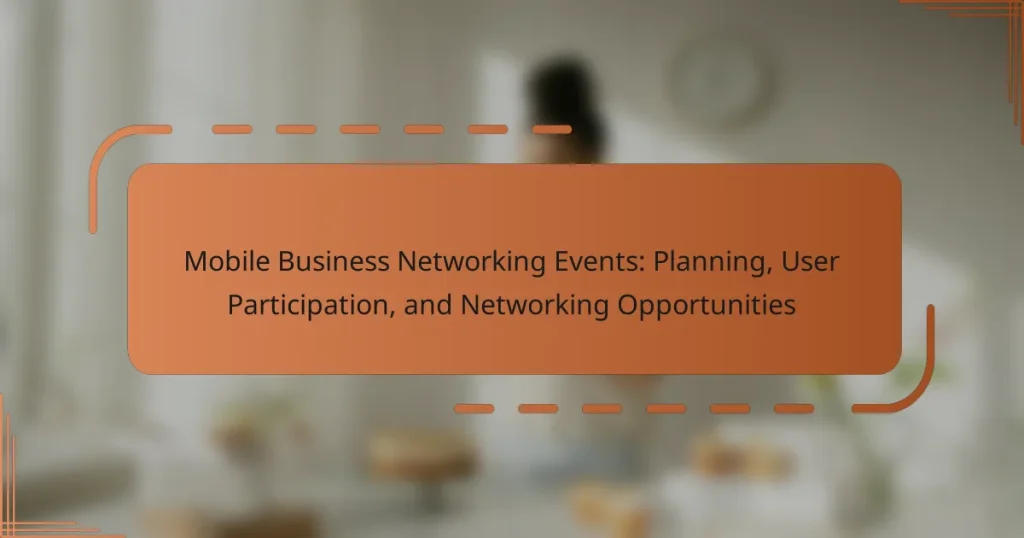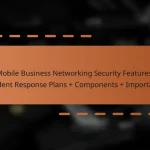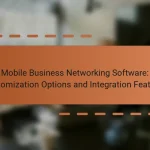Mobile Business Networking Events are professional gatherings that utilize mobile technology to enhance networking and collaboration among attendees. These events typically include features like speaker sessions, workshops, and interactive elements designed to facilitate connections and knowledge sharing. Effective planning involves defining clear objectives, selecting suitable mobile platforms, and promoting the event through various channels. Participants can maximize their experience by preparing in advance, actively engaging during discussions, and following up post-event to strengthen relationships. Research indicates that such events significantly contribute to career advancement and business growth by providing valuable networking opportunities.
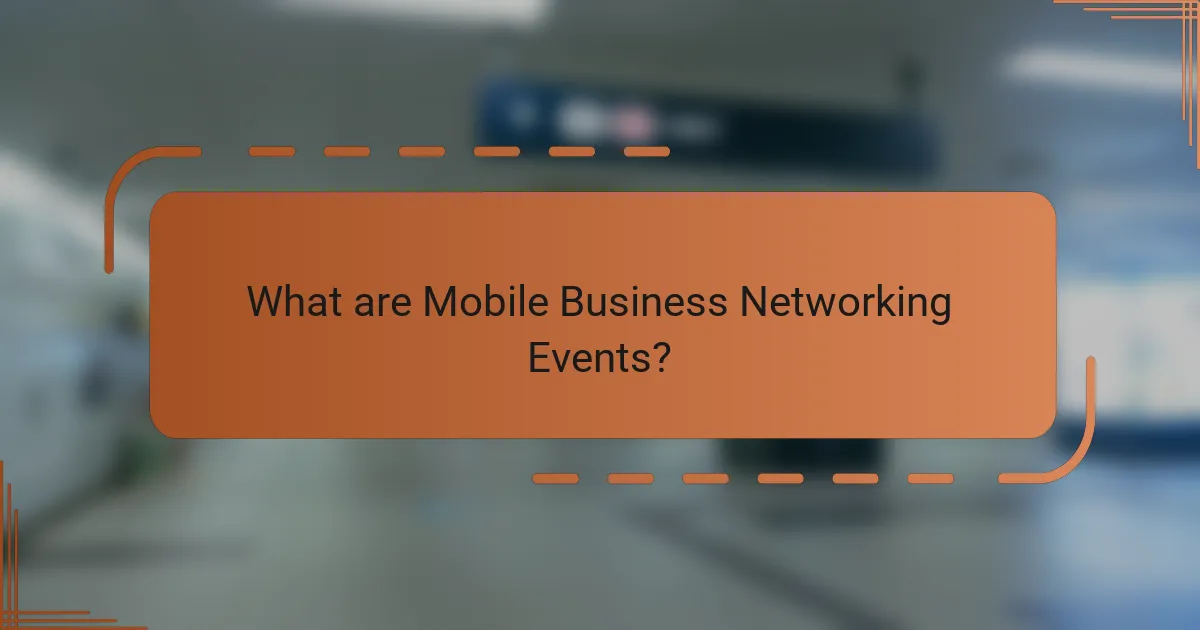
What are Mobile Business Networking Events?
Mobile business networking events are gatherings designed for professionals to connect and collaborate. These events leverage mobile technology to facilitate networking opportunities. Participants can use smartphones and apps to exchange contact information and schedule meetings. Mobile business networking events often feature speakers and workshops. These sessions provide insights into industry trends and best practices. The goal is to foster relationships that can lead to business opportunities. Studies show that networking can significantly enhance career prospects and business growth.
How do Mobile Business Networking Events differ from traditional networking events?
Mobile business networking events differ from traditional networking events primarily in their format and accessibility. Mobile events utilize technology to facilitate networking through apps and platforms. This allows participants to connect from various locations, unlike traditional events which typically require physical attendance.
Mobile events often feature real-time communication tools such as chat rooms and video calls. These tools increase engagement and interaction among attendees. Traditional events usually rely on face-to-face interactions, which can limit networking opportunities for those unable to attend in person.
Additionally, mobile networking events can accommodate larger audiences through virtual platforms. This flexibility can lead to a more diverse range of participants. Traditional events may have geographical limitations that restrict attendance.
Overall, mobile business networking events provide increased convenience and accessibility compared to traditional formats, enhancing networking potential.
What technological advancements facilitate Mobile Business Networking Events?
Technological advancements that facilitate Mobile Business Networking Events include mobile applications, virtual reality, and real-time analytics. Mobile applications allow attendees to connect, schedule meetings, and share information instantly. Virtual reality creates immersive environments for networking, enhancing engagement. Real-time analytics provide insights into attendee behavior and preferences, enabling tailored experiences. These technologies streamline communication and foster relationships among participants, improving overall event effectiveness.
What are the key features of Mobile Business Networking Events?
Key features of Mobile Business Networking Events include accessibility, real-time interaction, and targeted networking. These events utilize mobile technology to facilitate connections among participants. Attendees can join from anywhere using their devices. This enhances participation and allows for a diverse range of attendees. Real-time interaction is enabled through chat features and live polling. Participants can engage instantly, fostering dynamic discussions. Targeted networking is achieved through matchmaking algorithms. These algorithms connect individuals based on interests and professional backgrounds. Additionally, mobile platforms often provide event schedules and resources. This ensures that attendees can maximize their experience. Overall, these features create an efficient and engaging networking environment.
Why are Mobile Business Networking Events important for professionals?
Mobile business networking events are important for professionals because they facilitate valuable connections. These events provide a platform for individuals to meet potential clients, partners, and industry peers. Networking in this manner can lead to new business opportunities and collaborations. A study by the Harvard Business Review highlights that 70% of jobs are found through networking. Additionally, mobile networking events often utilize technology to enhance interaction, making it easier for participants to exchange information. This technological integration can increase engagement and streamline follow-up processes. Overall, these events are essential for professional growth and expanding one’s network.
How do these events enhance professional relationships?
Mobile business networking events enhance professional relationships by facilitating direct interactions among participants. These events create opportunities for individuals to connect in a focused environment. Attendees can share insights, experiences, and resources relevant to their industries. This exchange fosters trust and collaboration, essential for building strong professional networks.
Research shows that face-to-face interactions significantly increase the likelihood of forming lasting business relationships. According to a study published in the Journal of Business Research, networking events lead to a 70% increase in perceived trust among participants. Engaging in these events allows professionals to establish rapport and identify potential partnerships.
Overall, mobile business networking events serve as a catalyst for meaningful connections that can lead to future collaboration and success.
What role do Mobile Business Networking Events play in career development?
Mobile Business Networking Events play a significant role in career development by facilitating connections between professionals. These events allow individuals to meet industry leaders and peers, expanding their professional network. Networking can lead to job opportunities, mentorship, and collaborations. Research indicates that 70% of jobs are found through networking, underscoring its importance. Additionally, these events often feature workshops and discussions that enhance skills and knowledge. Participants gain insights into industry trends and best practices, contributing to their professional growth. Overall, Mobile Business Networking Events are essential for building relationships that advance careers.
What types of Mobile Business Networking Events are available?
Mobile business networking events include conferences, workshops, meetups, and trade shows. Conferences often feature keynote speakers and panel discussions. Workshops provide hands-on learning experiences and skill development. Meetups focus on informal networking and relationship building. Trade shows allow businesses to showcase products and services. Each event type serves different networking purposes. These events facilitate connections among professionals and foster collaboration.
What are the various formats of Mobile Business Networking Events?
Mobile business networking events can take various formats. Common formats include in-person meetups, virtual events, and hybrid gatherings. In-person meetups facilitate face-to-face interactions and relationship building. Virtual events leverage online platforms for networking without geographical constraints. Hybrid gatherings combine both in-person and virtual elements, allowing broader participation. Speed networking is another format, where participants engage in brief, timed interactions. Panel discussions and workshops provide structured networking opportunities while sharing valuable insights. Each format caters to different preferences and enhances networking possibilities.
How do industry-specific Mobile Business Networking Events cater to niche audiences?
Industry-specific Mobile Business Networking Events cater to niche audiences by focusing on targeted interests and needs. These events create tailored content relevant to specific sectors, enhancing engagement. They feature speakers and experts from the industry, providing valuable insights. Networking opportunities are designed to connect like-minded professionals. Attendees can share experiences and challenges unique to their field. The environment fosters collaboration and potential partnerships. According to a study by Eventbrite, 84% of attendees find industry-specific events more beneficial for networking. This targeted approach ensures that participants gain maximum value from their experience.
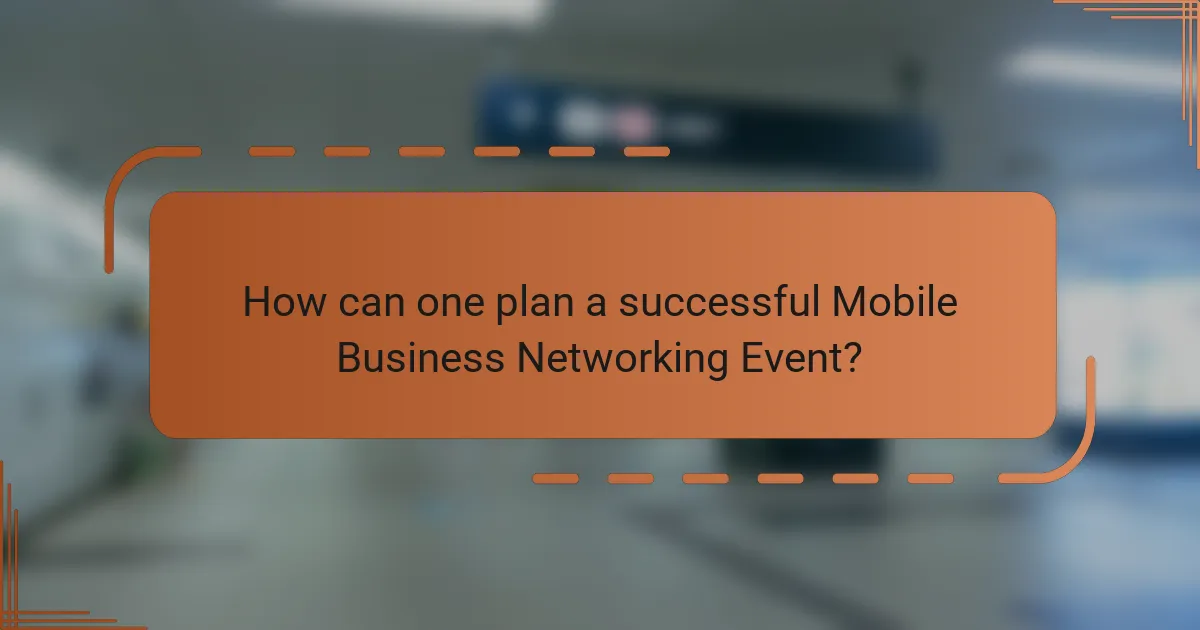
How can one plan a successful Mobile Business Networking Event?
To plan a successful Mobile Business Networking Event, start by defining clear objectives. Identify the purpose of the event, whether it’s to connect professionals, share knowledge, or foster partnerships. Next, choose an appropriate mobile platform that supports networking features, such as chat rooms and virtual meeting spaces. Schedule the event at a time that accommodates the target audience’s availability. Promote the event through various channels, including social media and email marketing, to attract participants.
Engage attendees with interactive elements such as polls, Q&A sessions, and breakout discussions. Provide opportunities for networking, such as virtual lounges or one-on-one meeting slots. Gather feedback post-event to assess success and identify areas for improvement. These strategies have been shown to enhance engagement and networking outcomes in past events.
What steps are involved in organizing a Mobile Business Networking Event?
Identify the purpose of the event. Define the target audience to tailor the event accordingly. Select a suitable venue that accommodates mobile technology. Set a date and time that maximizes attendance. Create an event budget to manage costs effectively. Promote the event through various channels to attract participants. Organize logistics, including registration and technology setup. Prepare an agenda that facilitates networking opportunities. Follow up with participants post-event to gather feedback.
How do you select the right venue and technology for the event?
To select the right venue and technology for the event, first assess the event’s purpose and size. The venue should accommodate the expected number of attendees comfortably. Consider accessibility for all participants, including transportation and facilities. Evaluate the venue’s technological capabilities, such as Wi-Fi availability and audio-visual equipment. Ensure the technology aligns with the event format, whether in-person, hybrid, or virtual. Research venues that have hosted similar events successfully. Look for feedback from previous users to gauge their experiences. This approach helps ensure a seamless event execution.
What strategies can be implemented for effective marketing of the event?
Utilizing social media platforms is crucial for effective event marketing. Platforms like Facebook, LinkedIn, and Instagram can reach diverse audiences. Creating engaging content, such as videos and infographics, promotes sharing. Email marketing campaigns can also target specific demographics. Personalized invitations and reminders increase attendance rates. Collaborating with influencers can amplify reach and credibility. Early bird ticket discounts create urgency and encourage early sign-ups. Lastly, leveraging event listing websites enhances visibility and attracts a wider audience.
What challenges might arise during the planning of Mobile Business Networking Events?
Challenges in planning Mobile Business Networking Events include logistical issues, technology integration, and participant engagement. Logistical issues may arise from coordinating venues, schedules, and transportation. Technology integration can be problematic, especially if platforms fail or are not user-friendly. Ensuring participant engagement can also be challenging, as attendees may not interact as expected. Additionally, measuring the event’s success can be difficult without clear metrics. These factors can hinder the overall effectiveness of the networking event.
How can one overcome logistical challenges in event planning?
To overcome logistical challenges in event planning, thorough preparation is essential. Start by creating a detailed event plan that outlines every aspect, including venue, equipment, and staffing. Utilize project management tools to track tasks and deadlines. Communication with all stakeholders is crucial for clarity and coordination. Establish contingency plans for potential issues, such as weather or technical failures. Conduct site visits to familiarize yourself with the venue and identify any logistical hurdles. Engaging experienced vendors can also streamline processes and reduce complications. Research indicates that 70% of successful events are attributed to effective planning and communication strategies.
What measures can be taken to ensure participant engagement?
To ensure participant engagement, incorporate interactive elements into the event. Activities such as polls, Q&A sessions, and breakout discussions encourage active participation. Utilize technology to facilitate real-time feedback and communication. Engaging content that resonates with participants’ interests keeps attention focused. Networking opportunities should be structured to promote connections among attendees. Providing incentives, such as prizes for participation, can boost engagement levels. Clear communication about the event’s agenda helps participants stay informed and involved. Research shows that interactive formats increase retention and satisfaction rates in events.
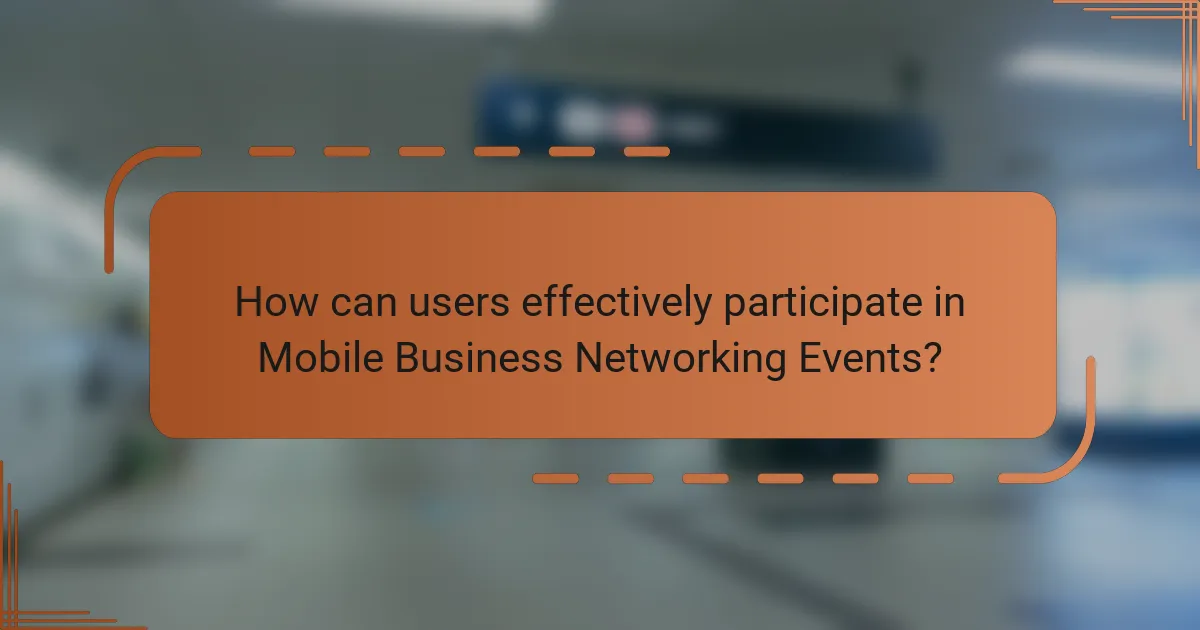
How can users effectively participate in Mobile Business Networking Events?
Users can effectively participate in Mobile Business Networking Events by preparing in advance. They should research the event agenda and attendee list. This helps identify key individuals to connect with. Users should also create a concise elevator pitch. This pitch should highlight their skills and objectives. Engaging actively in discussions is crucial. Users should ask questions and share insights relevant to the topics. Utilizing event-specific apps can facilitate networking. These apps often provide features for messaging and scheduling meetings. Following up after the event is essential for building lasting connections. A study by the Harvard Business Review states that follow-up increases the likelihood of successful networking outcomes.
What are the best practices for attendees at Mobile Business Networking Events?
Attendees at Mobile Business Networking Events should prioritize preparation and engagement. They should research attendees and speakers in advance. This helps in initiating meaningful conversations. Bringing ample business cards is essential for effective networking. Attendees should also be open to meeting new people and sharing their experiences. Actively participating in discussions enhances visibility and connection. Following up with new contacts after the event solidifies relationships. According to a study by the Event Marketing Institute, 79% of event attendees find networking valuable for their business growth.
How can attendees prepare for a Mobile Business Networking Event?
Attendees can prepare for a Mobile Business Networking Event by researching participants and topics. Understanding the event agenda helps in identifying key networking opportunities. Attendees should also prepare a concise elevator pitch to introduce themselves effectively. Bringing business cards is essential for easy contact sharing. Familiarizing oneself with mobile networking tools can enhance engagement. Setting specific goals for networking can guide interactions. Dressing appropriately for the event ensures a professional appearance. Lastly, following up with new connections post-event solidifies relationships.
What etiquette should be followed during networking interactions?
During networking interactions, individuals should prioritize professionalism and respect. Always introduce yourself clearly and confidently. Maintain eye contact to show engagement. Listen actively to others and avoid interrupting. Use polite language and a friendly tone. Follow up with contacts after the event to reinforce connections. Research indicates that effective networking can lead to increased opportunities, as noted in a study by the Harvard Business Review.
What tools can enhance user participation in Mobile Business Networking Events?
Mobile business networking events can enhance user participation through various tools. Networking apps facilitate real-time communication and connection among attendees. These apps often include features like attendee profiles, messaging, and scheduling. Event management platforms streamline registration and provide updates. Gamification tools encourage engagement through challenges and rewards. Polling and feedback tools gather insights from participants during the event. Social media integration promotes sharing and extends the event’s reach. Virtual reality tools create immersive networking experiences. Analytics tools measure participation and engagement metrics for future improvements.
How do mobile applications facilitate networking during events?
Mobile applications facilitate networking during events by providing attendees with tools to connect and interact. These apps often include features like attendee profiles, messaging, and event schedules. Attendees can view other participants’ backgrounds and interests. This information helps identify potential networking opportunities. Additionally, mobile apps often enable real-time communication through chat functions. Users can also set up meetings or share contact information easily. According to a study by Eventbrite, 70% of event-goers prefer using apps for networking. This shows the effectiveness of mobile applications in enhancing networking experiences during events.
What role do social media platforms play in enhancing user engagement?
Social media platforms significantly enhance user engagement by facilitating real-time interaction. They provide tools for users to share content, comment, and participate in discussions. Features like live streaming and polls encourage immediate feedback. According to a study by Pew Research Center, 69% of adults in the U.S. use social media. This broad usage allows businesses to reach diverse audiences effectively. Additionally, engagement metrics such as likes, shares, and comments indicate user interest and participation. Research shows that posts with images receive 650% higher engagement than text-only posts. Thus, social media platforms serve as vital channels for fostering user engagement in various contexts, including mobile business networking events.
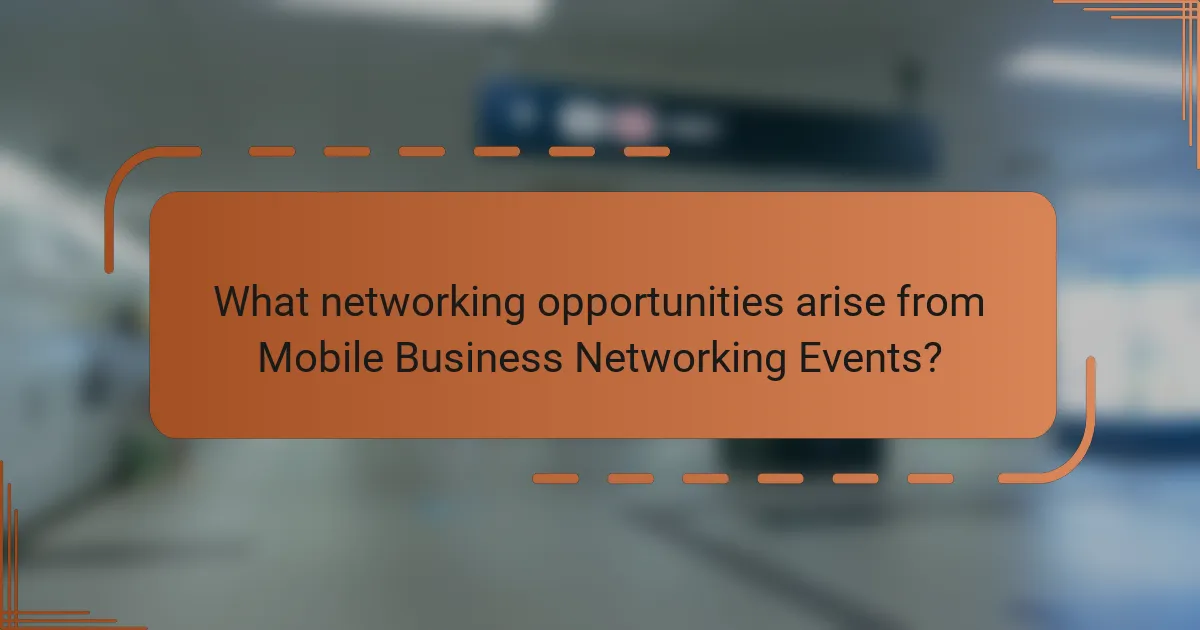
What networking opportunities arise from Mobile Business Networking Events?
Mobile Business Networking Events provide various networking opportunities for professionals. Attendees can connect with industry leaders and potential clients. These events often feature workshops and seminars that facilitate knowledge sharing. Participants can engage in one-on-one meetings to establish meaningful relationships. Networking sessions allow for informal interactions that can lead to collaborations. Mobile platforms enhance connectivity by enabling real-time communication among attendees. Research indicates that 70% of professionals find new business opportunities through networking events. Overall, these events serve as a catalyst for professional growth and partnership development.
How can attendees leverage connections made at Mobile Business Networking Events?
Attendees can leverage connections made at Mobile Business Networking Events by following up promptly after the event. They should send personalized messages to the contacts they made. This helps in reinforcing the connection and establishing rapport. Attendees can also schedule one-on-one meetings to discuss potential collaborations. Sharing relevant resources or information can further strengthen these relationships. Networking platforms and social media can be used to keep in touch and engage with these contacts. According to a study by the Harvard Business Review, effective follow-up increases the likelihood of converting connections into business opportunities. Maintaining these connections can lead to referrals, partnerships, and valuable insights in the mobile business sector.
What follow-up strategies are effective after the event?
Effective follow-up strategies after the event include sending personalized thank-you emails to attendees. This reinforces connections made during the event. Additionally, sharing event highlights through newsletters keeps participants engaged. Offering access to recorded sessions can provide value post-event. Surveys for feedback help improve future events and gauge attendee satisfaction. Connecting on social media strengthens professional relationships. Scheduling one-on-one meetings can deepen connections and facilitate collaboration. These strategies enhance attendee experience and foster ongoing engagement.
How can attendees convert connections into meaningful collaborations?
Attendees can convert connections into meaningful collaborations by actively engaging with their contacts. This involves following up with personalized messages after initial meetings. Attendees should express genuine interest in their connections’ work and propose potential collaboration ideas. Setting specific goals for collaboration can help clarify intentions. Scheduling follow-up meetings to discuss ideas in detail fosters deeper relationships. Sharing resources or insights relevant to the connection’s interests can add value. Attendees should also leverage social media to maintain contact and showcase their expertise. Research indicates that 70% of professional relationships are strengthened through consistent communication and shared experiences.
What are some tips for maximizing the benefits of Mobile Business Networking Events?
To maximize the benefits of Mobile Business Networking Events, attendees should prepare in advance. Research the event’s agenda and key speakers. Set specific networking goals to focus interactions. Utilize mobile apps associated with the event for real-time updates and connections. Actively engage in discussions and ask questions to build rapport. Follow up with new contacts promptly after the event to reinforce connections. According to a survey by Eventbrite, 90% of attendees find value in networking opportunities at events. This highlights the importance of proactive engagement in maximizing benefits.
How can one set specific goals for networking outcomes?
To set specific goals for networking outcomes, one must first identify desired results. These results can include expanding professional contacts or gaining industry insights. Next, it is essential to define measurable objectives. For instance, aim to connect with five new professionals at an event. Additionally, establish a timeline for achieving these goals. This could involve following up with contacts within a week after the event. Finally, evaluate the success of the networking efforts. This can be done by assessing the quality of new connections and any opportunities that arise. Setting specific, measurable, and time-bound goals enhances networking effectiveness.
What common pitfalls should be avoided during networking events?
Common pitfalls to avoid during networking events include failing to prepare an elevator pitch. An elevator pitch succinctly conveys your professional background and goals. Not having this ready can lead to missed opportunities. Another pitfall is neglecting to follow up with contacts after the event. Research indicates that 80% of networking success comes from follow-up communication. Additionally, being overly self-promotional can turn potential connections away. People prefer authentic conversations over sales pitches. Lastly, ignoring non-verbal communication signals can hinder relationship building. Studies show that body language accounts for 55% of communication effectiveness. Avoiding these pitfalls enhances networking success.
Mobile Business Networking Events are professional gatherings that utilize mobile technology to enhance networking opportunities and facilitate connections among participants. This article covers the differences between mobile and traditional networking events, the technological advancements that support them, and their significance for professional growth. Key features, types, and formats of these events are outlined, alongside strategies for effective planning and user participation. Additionally, the article discusses networking opportunities, follow-up strategies, and best practices to maximize benefits from these events.
